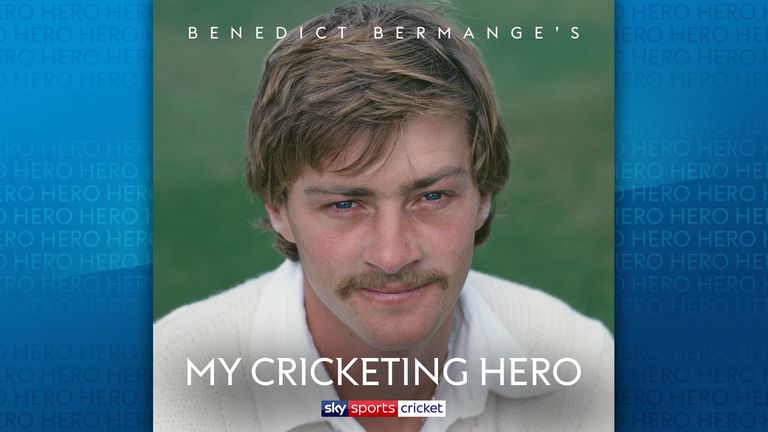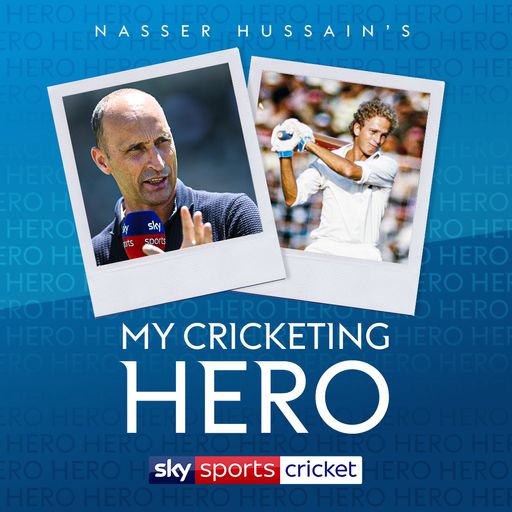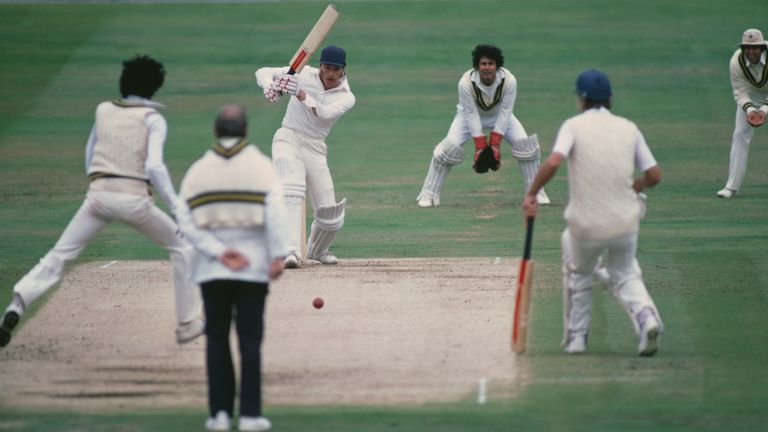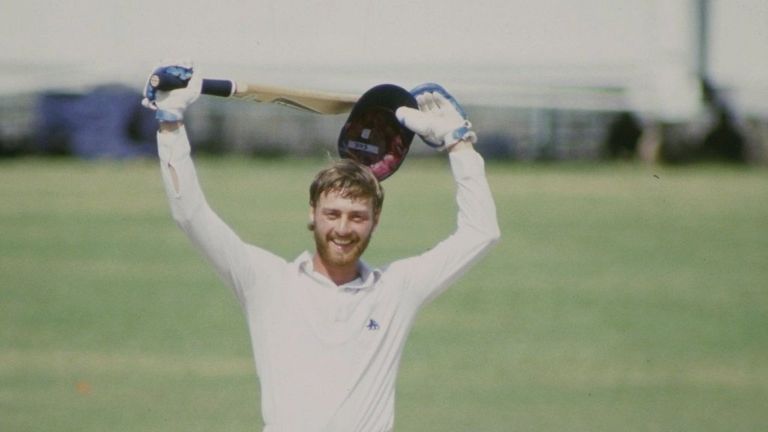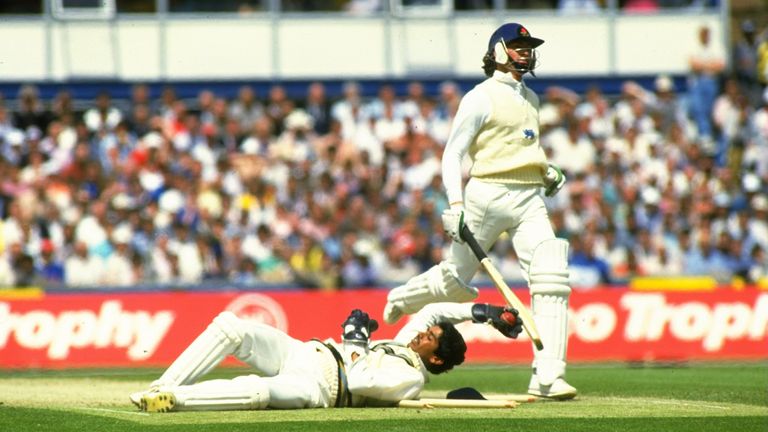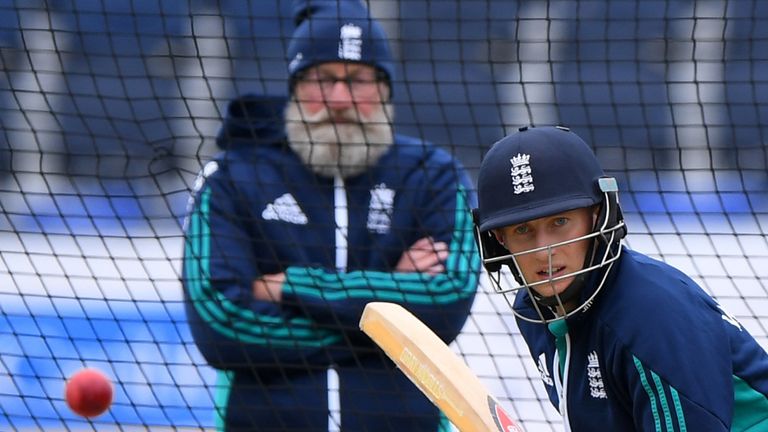My Cricketing Hero: Benedict Bermange picks Graeme Fowler
"His 19 years in charge of Durham's Academy became his lasting legacy, perhaps even more so than his 21 Tests for England"
Monday 13 April 2020 12:17, UK
Who did the Sky Sports Cricket pundits idolise growing up? Every Monday, we will be asking one of our experts for their cricketing hero. The series continues with statistician Benedict Bermange...
England were not very good in the 1980s.
There were some memorable moments and they won three Ashes series, but there were more troughs than peaks.
Despite that, it is easy to look back through rose-tinted glasses.
For someone growing up at an impressionable age, at least the period was never dull. It started with the chaos of the 1980/1 tour of the Caribbean which featured both tragedy (Ken Barrington's death) and controversy (the cancellation of the Guyana Test) and continued in similar fashion all the way through to the Second Rebel tour in 1989 which meant England used 29 players in the series.
Despite the paucity of the results, there was no shortage of heroes for a young cricket fan. There was the golden-haired Adonis David Gower, who bestrode the era as if he had descended from Mount Olympus and who delighted and frustrated fans to the same degree.
There was the superhero Ian Botham, who interspersed winning Ashes series single-handed with serving bans for drugs and raising vast amounts of money for charity.
There was also the pugnacious bulldog Allan Lamb, who took on the might of the West Indies single-handed and Mike Gatting, whose girth gave hope to club cricketers everywhere that they could tuck into a mighty tea and still perform miracles with the bat afterwards.
So there were plenty of potential heroes to choose from, but - perhaps surprisingly for someone who grew up just outside London and whose first trip to watch live cricket was to Lord's - the player I learned to love more than all was Graeme Fowler.
England were on the lookout for a new opening partnership after both Graham Gooch and Geoff Boycott opted to go to South Africa for the 1981/82 tour and were subsequently banned for three years. Having used a combination of Derek Randall, Geoff Cook and Chris Tavare throughout the 1982 summer, for the final Test against Pakistan at Headingley the selectors plumped for a slim left-hander from the same Lancashire town as David Lloyd.
Fowler first hit the headlines that year by scoring twin centuries in an extraordinary Lancashire victory over Warwickshire - uniquely scoring them with a runner in each innings. He immediately impressed, striking 86 in the second innings which helped England to victory, and that was enough to earn him a trip to Australia for the subsequent Ashes tour.
He missed the first Test but restored to opening duties at the Gabba, he struck 83 in the second innings but England lost the match and eventually the series. Back in England, a maiden century came against New Zealand at The Oval in June 1983 and he hit four successive fifties as England reached the semi-finals of the World Cup the same year. In 1984 he was the only England batsman apart from Lamb to score a century in the 'blackwash' series against the West Indies, and better was to follow the following winter.
Morning break in my primary school ran from 10:35am - 11:00am, which meant that I could sneak off to the library and listen to the last 25 minutes of play of each day's play in India on the radio. Of course I would inevitably be a few minutes late for my next lesson as play would occasionally extend to three or four minutes past the hour, but I could always explain that away.
It was on that tour 'Foxy' achieved legendary status in my nine-year-old mind as he struck 201 at Madras to become the first England batsman to score a double-century in a Test in India. England went on to come from behind to win that series 2-1 - their last triumph in a Test series in India for 28 years.
Everyone expected Gooch to return to the England fold for the Ashes summer of 1985 and he duly did so, but things could not have gone worse for Fowler. His form totally deserted him and it was his opening partner in the Indian triumph - Tim Robinson - who ended up partnering Gooch in the summer's triumphant series.
Fowler could hardly buy a run and discovered that he had two crushed bones in his neck - the result of a car accident way back in 1979. What should have been a writing commission to write a diary of a Test cricketer ended up as a diary of a injured Lancashire Second XI player. But I never gave up hope of seeing him returning to England colours, despite his season's first-class return of just 428 runs at the paltry average of 17.12
Eventually 1986 rolled around and Lancashire started their County Championship season against Sussex at Hove. Fowler was back at the top of the order and struck 180 as Lancashire won handsomely. It earned him an ODI recall for the Texaco Trophy Matches against India. He had reached 20 in the first match before a mid-innings collision with Gatting - one he was never going to win - caused him to be run-out. After scoring just 10 in the next match, he was dropped from the England side for good.
One of the delights in growing up near Lord's was to be able to go to the ground early and watch the players practise on the Nursery Ground before intercepting them on their way to the pavilion once they had finished.
In 1986 Lancashire's match against Middlesex was luckily scheduled in my school holidays in August and so I approached my hero, book-in-hand with the immortal words: "You are my favourite cricketer. Did you know that?". Unsurprisingly, his reply was "no" but he signed my book nonetheless, and I still treasure that signature to this day.
Far from letting his England disappointment get him down and to my immense delight, he had a career year in 1987, scoring 1,800 runs as Lancashire nearly won the County Championship for the first time since 1934. When Nottinghamshire pipped them at the post, this 12-year-old was in floods of tears. It was to be another 24 years before they put that right.
Having studied at Durham University, it seemed a good fit for Fowler to return to the North East for some of the newest first-class county's earliest skirmishes, and he spent two seasons there before retiring to set up the Durham University Academy. I was never a good enough player to benefit from his wisdom during my three years studying there but he helped to establish a trailblazing establishment which shaped the future careers of up to 60 cricketers, including Andrew Strauss.
Things continued to never be dull for him - memorably called a "weasel-faced love cheat" by a national paper - but his 19 years in charge of that Academy became his lasting legacy, perhaps even more so than his 21 Tests for England. Not only that, but he has became a powerful advocate for mental health, with a recent book chronicling his battles with depression and offering a blueprint for helping to deal with the issues he faced.
Some people offer the advice never to meet your heroes. I have been fortunate enough to share a pint, commentary box and dinner table with mine. Whenever I found myself up in Durham he was the one person I would try to seek out and he would often be found in the 'Victoria Inn' on Hallgarth Street holding court with an enthralled selection of students, locals, journalists and anyone else who would listen.
He is also the possessor of the finest England cricketer's beard since WG Grace.

